Iran launches ‘over 200 drones, ballistic and cruise missiles’ towards Israel in first ever direct attack

Iran has fired a “massive swarm” of more than 200 killer drones as well as ballistic and cruise missiles towards Israel, the Israeli military has said, igniting fears of region-wide war.
It is Tehran’s first-ever direct attack on Israel’s soil, officials confirmed, which comes amid boiling tensions following the country’s devastating six-month war in Gaza.
Air raid sirens wailed and explosions lit up the skies over Israel, the occupied West Bank and Jordan overnight Saturday, as Iran’s Revolutionary Guards confirmed it launched the attack it has dubbed “Operation True Promise”.
Rear Admiral Daniel Hagari, the Israeli military spokesperson, said together with Israel’s allies and partners across the region they had intercepted the “vast majority” of drones. But some landed inside Israel causing “minor damage” to an Israeli military base and injuring a 10-year-old girl.
“Our planes are in the air. Tonight’s wide scale attack by Iran is a major escalation. Together with our allies and partners we are operating at full force to defend the state of Israel and the people of Israel,” he added.
The UK and the US confirmed their jets in the region have been deployed to shoot down the missiles, and there were later reports they had successfully downed drones over Iraq-Syria border area. Prime minister Rishi Sunak condemned in the “strongest terms” Iran’s “reckless attack” and pledged to “continue to stand up for Israel‘s security and that of all our regional partners”.
Joe Biden affirmed the US’s “ironclad” support for Israel against the threats from Tehran.
Israel has been on high alert as Iran had been threatening retaliation for a strike on its Damascus consulate on 1 April that killed seven officers, among them two senior commanders. Israel has neither confirmed nor denied responsibility for the consulate bombing.
Iran’s mission to the United Nations said on X, formerly known as Twitter, that Saturday’s unprecedented attack was a direct response to Israel’s “aggression”.
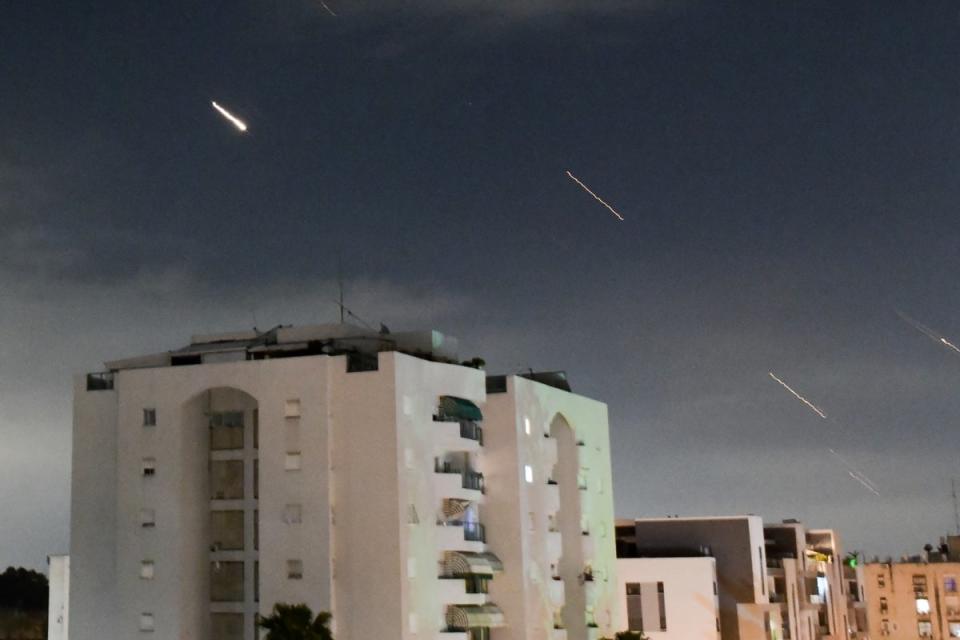
The Israeli military meanwhile warned that there would probably be several “waves of drones” following the first salvo.
“We are continuing to intercept dozens of attack drones as well as cruise missiles and ballistic missiles outside of Israel’s border,” said Rear Admiral Hagari, after the country shut down its airspace and warned citizens in the northern parts of the country to take shelter. The event is ongoing, he added as another Israeli military official told reporters that there may be “more waves of drones” through the night.
The same military official said that Israel was coordinating with United States Central Command (Centcom) as well as the United Kingdom. US Centcom chief General Erik Kurilla visited Israel two days ago to discuss these plans.
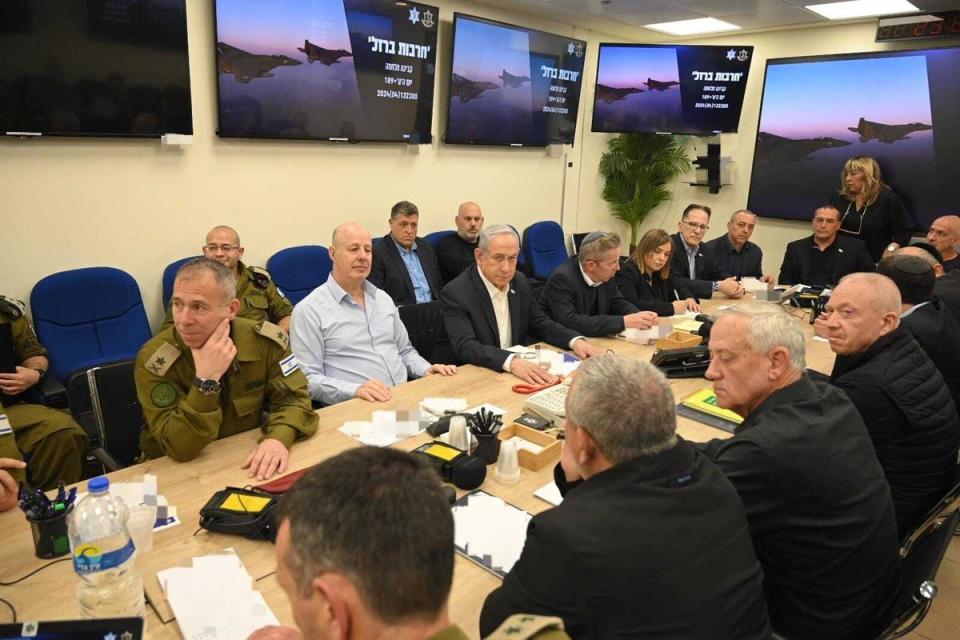
“There are tens of aircraft in Israel’s skies at this time. We have conducted some GPS scrambling ,” the official added, without going into more detail. Explosions lit up the sky in Jerusalem, as well as the Jordanian capital Amman as apparent interceptions took place.
In a late-night statement on Saturday, the British Ministry of Defence said in response to “increased Iranian threats” and the growing risk of escalation in the Middle East, the UK government had moved several additional Royal Air Force jets and air refuelling tankers to the region. “These will bolster Operation Shader, which is the UK’s existing counter-Isis operation in Iraq and Syria.
“In addition, these UK jets will intercept any airborne attacks within range of our existing missions, as required.”
An official at the Pentagon also confirmed US aircraft were involved. “In accordance with our ironclad commitment to Israel’s security, US forces in the region continue to shoot down Iranian-launched drones targeting Israel. Our forces remain postured to provide additional defensive support and to protect US forces operating in the region,” the statement read.
Later sources told Reuters that US and British jets had shot down drones over the Iraq-Syria border. Regional sources told Reuters that Jordanian jets downed dozens of Iranian drones flying across northern and central Jordan heading to Israel.
“Obviously everybody between here and Tehran is being impacted by what’s happened over the last few hours,” the Israeli military official added. “It’s a regional regional threat. The turmoil that Iran has caused this evening is unprecedented.”
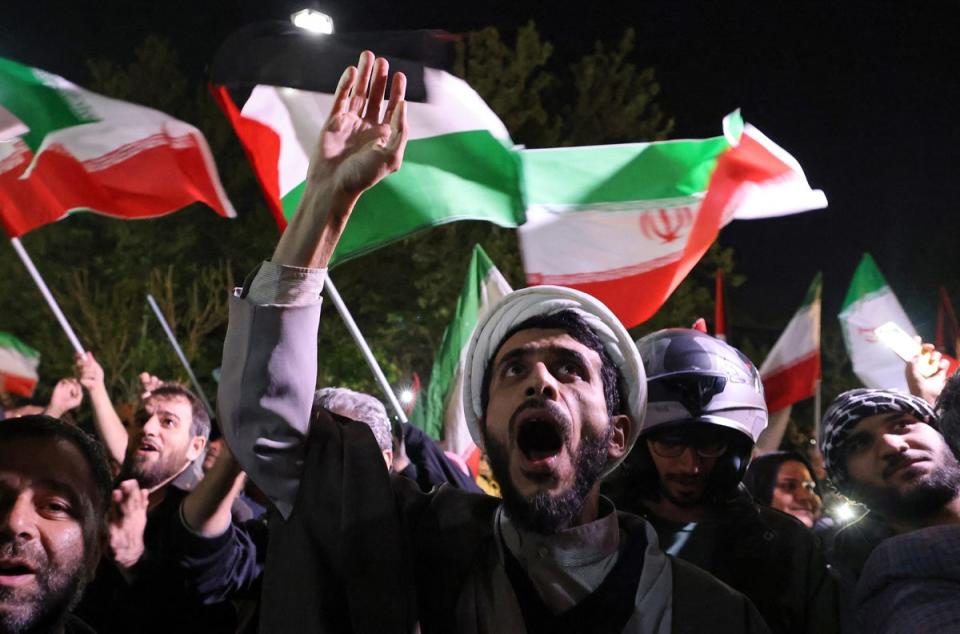
Israel launched an unprecedented bombardment of the besieged strip in October, in retaliation for Hamas bloody attack on southern Israel where militants killed over 1100 people and took more than 240 hostage.
Since then Isreal’s offensive has killed more than 33,000 people in Gaza according Palestinian health ministry and sparked a devastating famine. The war, now in its seventh month, has also driven up tensions in the region, spreading to fronts with Lebanon and Syria and drawing long-range fire at Israeli targets from as far away as Yemen and Iraq.
Iran’s drone attack – the first ever direct attack on Israeli soil – could see an even wider front open. Iran’s mission to the United Nations said on X that the wave of drones was “legitimate defence” for the attack on its consulate in Damascus.
It said: “The matter can be deemed concluded”, unless Israel strikes again. It warned the US to “stay away”. President Biden, who on Friday warned Iran against attacking Israel after saying such a scenario appeared imminent, has pledged to stand with its ally against Iran, the White House said.
Prime minister Benjamin Netanyahu, at the Kirya military base in Tel Aviv, convened the war cabinet where he told Israeli citizens that Israel had been preparing for a direct attack from Iran for “years”.
“Our defensive systems are deployed; we are ready for any scenario, both defensively and offensively.
“We appreciate the US standing alongside Israel, as well as the support of Britain, France and many other countries. We have determined a clear principle: whoever harms us, we will harm them. We will defend ourselves against any threat and will do so level-headedly and with determination.”
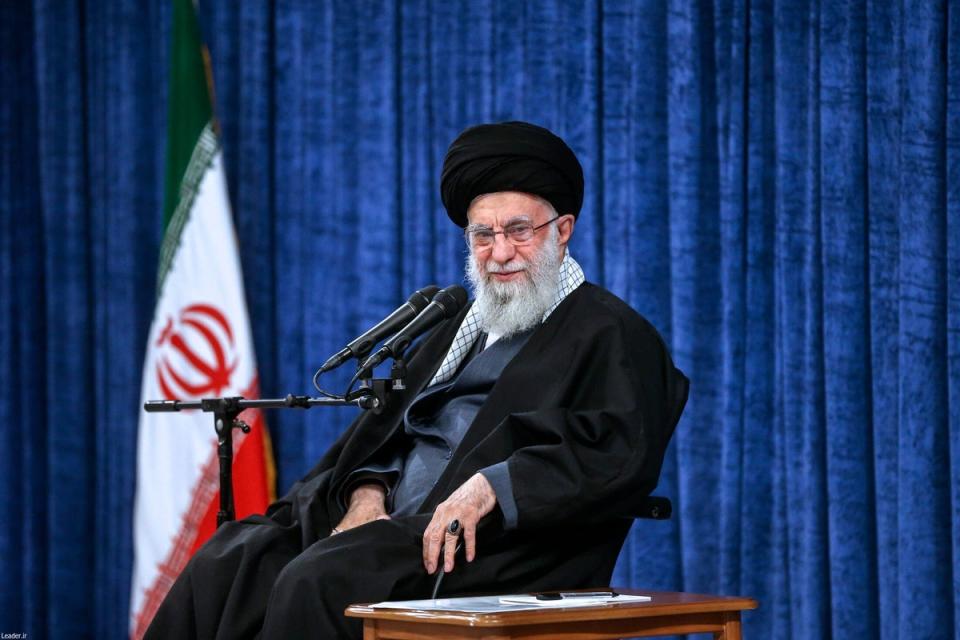
Israel’s military put the northern part of the occupied Golan Heights as well as Nevatim, Dimona and Eilat on standby for possible impact from Iranian drone launches early on Sunday, instructing residents to stay close to bomb shelters. Its home guard said there will be no educational activity throughout the country. Also, gatherings of over 1,000 people are prohibited.
Multiple neighbouring countries have closed their airspaces following the launch of the attack, including Lebanon and Jordan.
Syria has put its Russian-made Pantsir ground-to-air defence systems around the capital Damascus and major bases on high alert in the event of an Israeli strike, army sources said. They said they expected Israel would retaliate against army bases and installations where pro-Iranian militia were based, following the drone strike.
Iran’s attack comes after months of ratcheting tensions in the region over Israel’s war in Gaza reached new levels last week.
The White House said on Saturday that Mr Biden had cut short his weekend plans to confer with national security advisers.
Hours later, Iran's Revolutionary Guards seized a cargo ship in the Strait of Hormuz on Saturday, saying the vessel was linked to Israel.
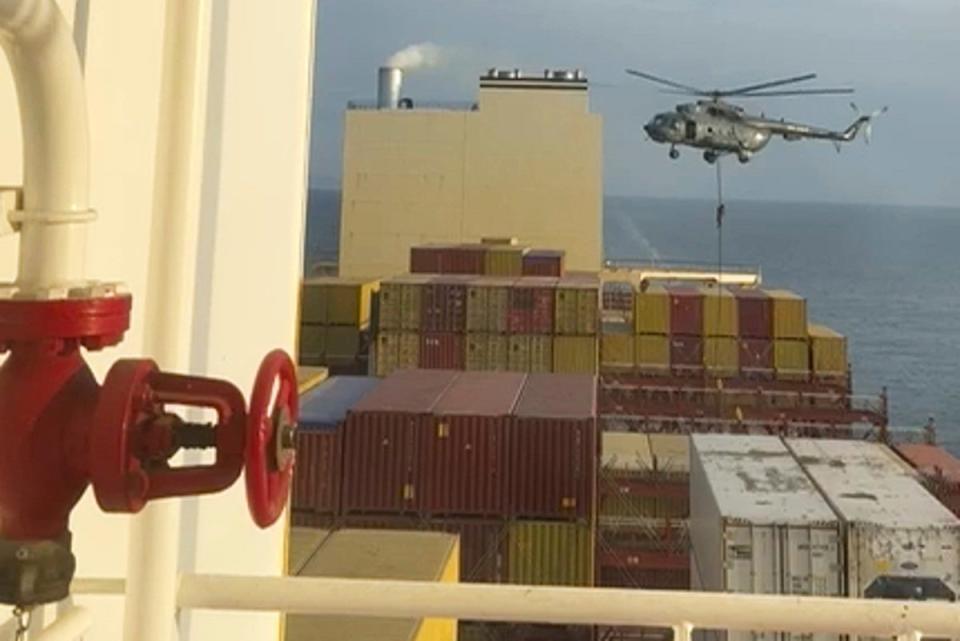
There are concerns this could trigger further conflict and a region-wide war. Iran said on Sunday it will not hesitate to take further “defensive measures” to protect its interests against any military aggression, the Iranian foreign ministry said in a statement.
“Iran, if necessary, will not hesitate to take further defensive measures to safeguard its legitimate interests against any military aggressions and unlawful use of force,” it said, according to state TV, “while reaffirming its commitment to the principles of the United Nations Charter and international law.”


